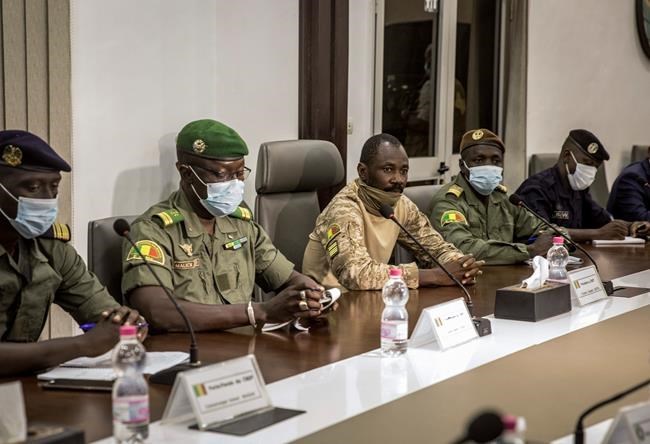
Col. Assimi Goita, center, who has declared himself the leader of the National Committee for the Salvation of the People, is accompanied by group spokesman Ismael Wague, left, and group member Malick Diaw, center-left, as they meet with a high-level delegation from the West African regional bloc known as ECOWAS, at the Ministry of Defense in Bamako, Mali, Saturday, Aug. 22, 2020. Top West African officials are arriving in Mali's capital following a coup in the nation this week to meet with the junta leaders and the deposed president in efforts to negotiate a return to civilian rule. (AP Photo)
Republished August 24, 2020 - 10:20 AM
Original Publication Date August 24, 2020 - 3:21 AM
BAMAKO, Mali - The military junta now in charge of Mali insisted Monday that former President Ibrahim Boubacar Keita had resigned of his own free will and was not overthrown, as the officers now running the country try to prolong their rule until 2023.
While the international community has been pressing for an immediate return to civilian rule, the junta says it wants to oversee the transition for the next three years, according to those participating in the negotiations between the military leaders and neighbouring countries.
The junta's spokesman, Ismael Wague, later said that no timeline had been established for elections to return to the country to civilian rule. He maintained that Keita — who still had three years left in his final term — had not resigned because he was under pressure from mutinous soldiers.
The visiting delegation from the regional bloc, ECOWAS, had met with the 75-year-old former president, who was being held at the military barracks in Kati near the capital.
“President Keita told us that he has resigned, that he was not forced to do so and that he does not want to return," said former Nigerian President Goodluck Jonathan on Monday. "He says he wants a quick transition to allow the country return as soon as possible to a civilian regime.”
To the outside world, however, last week's political upheaval bore all the hallmarks of a coup d'etat. Soldiers at the Kati barracks launched a mutiny in the morning, and then began rounding up officials in Bamako. They later encircled the private residence where Keita was staying with his prime minister and fired shots into the air. The junta has maintained they took him into custody for his own protection.
Just before midnight he appeared on state broadcaster ORTM and announced his immediate resignation, and the dissolution of his government and the National Assembly. Before dawn, five military officers crowded around a table and announced their committee was now in control.
Keita, who had won the 2013 democratic election in a landslide, was re-elected five years later. His popularity plummeted though as his government failed to rein in Islamic extremist in the north and the military faced punishing losses from the jihadists. Others pointed to his use of a private jet and his son's influential position in the National Assembly as signs he was out of touch with a suffering nation.
An official who spoke on condition of anonymity Monday told The Associated Press that coup leaders said during the negotiations that they first want to draft a new constitution before holding elections. The official spoke on condition of anonymity as they were not authorized to speak to journalists.
That proposal will likely be rejected by West African regional mediators and former colonizer France: It's more than double the time it took to hold a vote after a similar coup in 2012, and would allow the soldiers who overthrew a democratically elected president to remain in power for years.
The ECOWAS mediators initially had called for Keita to be reinstalled as president, but that prospect has become unlikely amid an outpouring of public support in Mali for the coup d'etat. Thousands took to the streets on Friday in a show of support for the junta's leadership.
African countries and the wider international community have expressed fears the upheaval could allow Islamic extremist to extend their reach. Mali has been fighting against Islamic extremists with heavy international support for more than seven years, and jihadists have previously used power vacuums in the country to expand their territory.
Demonstrators had begun taking to the streets to call for Keita's resignation back in June. He offered concessions and regional mediators intervened, but his opponents made it clear they would accept nothing short of his departure.
Mali’s opposition coalition, the M5-RFP, has welcomed the ouster of Keita but they insisted they remained “deeply attached to democracy.”
___
Associated Press writer Krista Larson in Dakar, Senegal contributed.
News from © The Associated Press, 2020